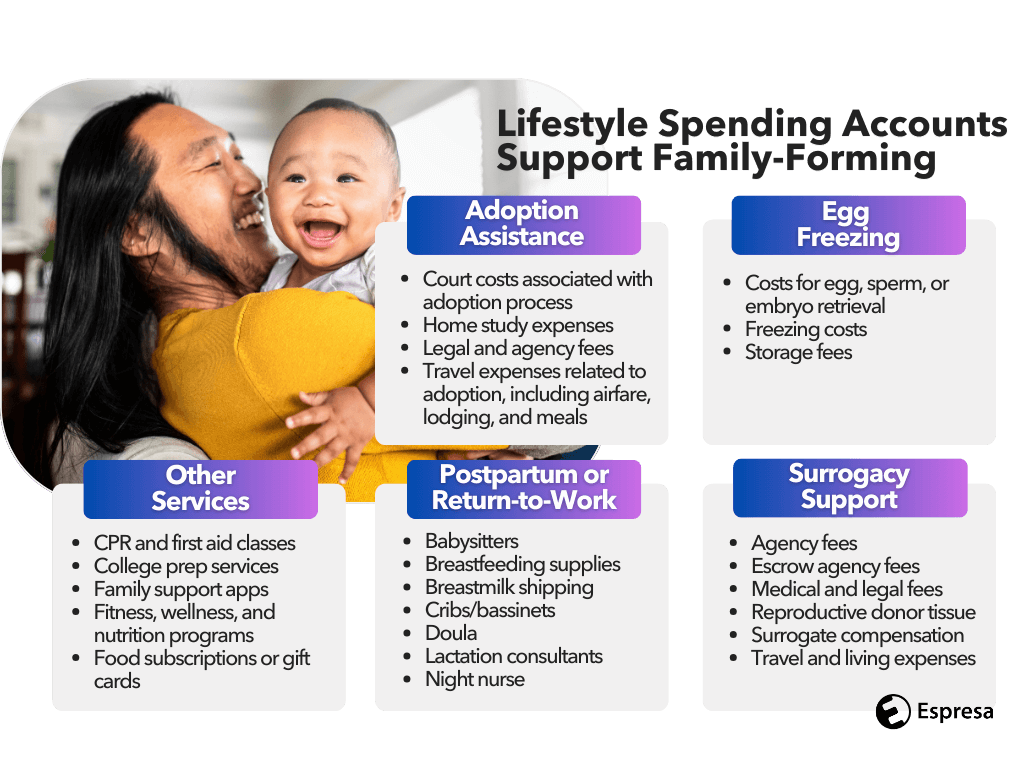In the dynamic, evolving business landscape, support for working parents is mission-critical. A powerful way to stand out as a business leader is to offer comprehensive family-forming benefits. When traditional benefits fall short of meeting your employees’ diverse needs, support for fertility treatments, adoption, surrogacy, and egg freezing is an investment in family-building on behalf of your people. A flexible benefits program levels up your dedication to employee well-being and fosters a supportive, inclusive work environment for everyone.
A company culture that values and empowers employees seeking to become parents cultivates a more engaged, productive, and loyal workforce. At least one in eight U.S. couples has trouble conceiving, and the World Health Organization reports that one in six people globally are affected by infertility. Family-building benefits transform employee engagement, alleviating stress and anxiety while promoting a healthy work-life balance. In this article, we’ll explore the benefits of family-building support to your employees and your organization.
Here’s what we’ll cover:
- What are family-forming benefits?
- How are family-forming benefits different than parental benefits?
- Why family-forming benefits are essential for employee well-being
- Empower your people with inclusive, flexible benefits
What are family-forming benefits?
Family-forming benefits are a game-changer for employees, offering comprehensive support at every stage of their family-building journey. From adoption assistance to surrogacy support and egg freezing, these benefits empower employees to achieve their family goals with ease and confidence.
Family-forming benefits and parental benefits are often used interchangeably, but they have distinct meanings. The main difference is that family-forming benefits support employees at all stages of their family expansion journey, while parental benefits support employees who are already parents or are expecting a child.

Adoption assistance
Adoption assistance can be a lifeline for aspiring adoptive parents, covering essential costs like legal fees, home studies, travel expenses, paid adoption leave, and post-adoption support. The average cost of adopting a child in the United States is between $20,000 and $45,000, according to the Child Welfare Information Gateway from the U.S. Department of Health and Human Services.
With adoption assistance benefits, employees can navigate the adoption process with greater ease and focus on welcoming their new child. A 2023 report by the Dave Thomas Foundation for Adoption found that 28% of employers now offer this benefit, with an average reimbursement of $10,000 per adoption.
Surrogacy support
Surrogacy support is a valuable asset for employees exploring this option. By covering agency fees, escrow costs, donor expenses, medical and legal fees, and surrogate compensation, employers can alleviate financial stress and create a supportive environment for employees navigating the complexities of surrogacy.
The cost of surrogacy in the United States can be well over six figures. While only 9% percent of employers provide a surrogacy reimbursement program according to a 2021 survey by Willis Towers Watson, those that do are leading the way in employee-centered policies.
Fertility and egg-freezing benefits
According to a 2023 Willis Towers Watson survey, 40% of employers offered some form of fertility benefits, an increase from 30% in 2019. Egg freezing is another future-focused benefit gaining traction. 16% of employers now cover this procedure, according to the 2024 IFEBP Employee Benefits Survey. By offering egg-freezing benefits, companies empower employees to preserve their fertility and plan for their future.
Beyond family-forming wallets, targeted reimbursements—often seen as lifetime wallets—require ongoing financial support. This kind of long-term investment showcases a company’s deep commitment to employee well-being. When employers offer comprehensive family-building benefits, they demonstrate their dedication to employee well-being and create a family-friendly workplace culture, boosting employee morale and driving business success.
How are family-forming benefits different than parental benefits?
Family-forming benefits and parental benefits are often used interchangeably, but they have distinct meanings. The main difference is that family-forming benefits support employees at all stages of their family expansion journey, while parental benefits support employees who are already parents or are expecting a child.
Parental support includes traditional benefits and family-friendly benefits like parental leave and childcare assistance. Future-focused organizations offer postpartum and return-to-work support like returnship programs, doulas, night nurses, lactation consultants, breastfeeding supplies, and sleep training resources to meaningfully support working parents. Additionally, work-life balance perks and well-being programs, including fitness classes, on-site massages, wellness reimbursements, and nutrition counseling, can help employees maintain their physical and mental health.
Providing family formation benefits demonstrates a company’s genuine care and support for its employees’ personal lives. Prioritizing parental well-being fosters a positive work environment, leading to increased employee well-being and job satisfaction. It shows a commitment to your people’s future —in and out of the workplace.
Why family-forming benefits are essential for employee well-being
Investing in family-forming and parental benefits is a strategic decision that yields significant returns for employers in terms of employee loyalty, satisfaction, and overall company success. Demonstrating care for your employees’ well-being inside and outside the office helps them feel more connected to your company and their work.
Support employee well-being and satisfaction
According to a 2024 Employee Benefits Survey by SHRM, 70% of employees report higher job satisfaction with family support benefits.
Providing family formation benefits demonstrates a company’s genuine care and support for its employees’ personal lives. Prioritizing parental well-being fosters a positive work environment, leading to increased employee well-being and job satisfaction. It shows a commitment to your people’s future—in and out of the workplace. Innovative companies like Airbnb, Agios, Avalara, Cooley, Genentech, Pinterest, Sage Therapeutics, Samsung, and TouchTune are leading the way with family-building and expansion benefits for their teams.
Case Studies: Learn how people-first companies are supporting diverse workplaces
Attract top talent and improve retention
In today’s competitive job market, offering family expansion benefits can give employers a significant advantage in attracting top talent. This helps to build a strong, skilled workforce and boost employee retention. The financial impact of fertility support is significant. Carrot’s Global Fertility at Work Survey found that 65% of respondents would change jobs for fertility benefits, while 72% would stay longer if they had access to them.
Family expansion benefits can be a powerful recruiting and retention tool. Organizations offering benefits such as fertility services and parental leave report greater success in recruiting top talent compared to those that did not.
Enhance employee loyalty and engagement
When employees feel valued and supported, they are more likely to be loyal to their employers. Offering family-forming benefits can significantly reduce turnover rates, saving companies time and resources spent on recruitment and training.
Organizations that offer family formation benefits, including support for LGBTQ+ employees and single parents, often report higher employee engagement and commitment. Maven Clinic reports that 60% of LGBTQ+ people plan to use assisted reproductive technology (ART), surrogacy, or adoption to expand their families.
Inclusion of all types of family building fosters a supportive work environment, strengthens corporate culture, and improves retention. A 2023 survey by FertilityIQ found that employees with fertility benefits are 1.5 times more likely to recommend their employer, and research from the International Foundation of Employee Benefit Plans (IFEBP) highlights that fertility services are highly valued and can help reduce overall healthcare costs while enhancing employee satisfaction.
Boost productivity
A happy and fulfilled workforce is more productive. When employees feel their needs and well-being are cared for, they are more likely to go the extra mile and contribute positively to the company culture.
A June 2023 Gartner survey of nearly 3,500 employees found that those who report being energized and excited about their work are 31% more likely to stay at their organization, 31% more likely to go above and beyond (discretionary effort), and they contribute 15% more to productivity. By investing in parenthood planning benefits, companies can create a supportive environment that allows employees to focus on their work without undue stress or anxiety.
Empower your people with inclusive, flexible benefits
An LSA can empower your employees to pursue their family growth goals with freedom and choice. By offering family-forming benefits within an LSA Wallet or a wellness stipend, you can support employees on their journey, boost satisfaction, and improve retention. This empowers employees to allocate funds according to their unique needs, creating a more meaningful benefit.
How do family-forming benefits support Diversity, Equity, and Inclusion (DEI) initiatives?
Family-forming benefits champion inclusion by embracing the beautifully diverse ways employees build their families. They ensure everyone—no matter their gender, sexual orientation, or unique journey—has equitable access to the resources they need. It’s about creating a workplace where all paths to parenthood are supported and celebrated, so every employee feels valued and included.
Why should employers offer family-building benefits?
Family-building benefits are a game-changer for both employees and employers. They build loyalty, help attract top talent, and support a healthier work-life balance. Offering these benefits sends a clear message: your company is invested in your people’s well-being and the future they’re working toward, both at work and at home.
What are employer fertility benefits?
Fertility benefits provide support for treatments like IVF, egg freezing, and other reproductive health services. They ease the financial burden for employees by covering expenses often left out of traditional health plans, empowering them to pursue their family-building dreams with confidence.
Ready to invest in the future of your organization? Discover how Espresa’s comprehensive benefits platform can offer flexible, personalized support to revolutionize your organization. Contact us today to schedule a demo!
How to Score Top Talent with an Inclusive Employee Benefits Strategy
Sarah Claxton
Sarah is the Marketing Director at Espresa, based in Tahoe City, California.
More by Sarah Claxton



